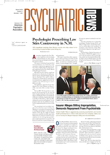After several years of meetings in which members of APA’s Board of Trustees spent considerable time grappling with the declines in the Association’s fiscal condition and membership rolls, last month’s Board meeting reflected an organization on a steadier course.
APA Treasurer Carol Bernstein, M.D., and Finance and Budget Committee Chair Jack Bonner, M.D., described a brightening fiscal future that will see APA end with a budgetary surplus in 2003. Bonner also presented, and the Trustees accepted in principle, a balanced budget for 2004 that includes a partial but substantial replenishment of APA’s reserve funds, which had been used to fund operating expenses over recent years. (The Board gives final approval to the budget at its December meeting.)
APA Medical Director James H. Scully Jr., M.D., also pointed out that the Association’s membership numbers are holding steady this year, after several years of decline, a situation that has a major impact on the income APA receives from annual dues payments.
The Board voted to devote $50,000 each to two issues of concern to APA members and their patients.
One of the funded initiatives authorizes the medical director to provide urgently needed “infrastructure” aid to APA’s smallest district branches. Many of these small district branches, most of which are staffed by at most one or two individuals, often on a part-time basis, are struggling financially and weighing layoffs of secretaries and executive directors or shutting down for part of the year. Several Board members urged these branches to consider combining with each other or with a larger district branch as a way to increase resources and staffing.
The other funded project is a training conference on patient safety issues. District branches and state associations will designate a representative to attend the conference. The topics will include medication errors, “the influence of systems on the practice of psychiatry,” communication barriers, and information on dealing with “information overload” and “time pressures,” among others.
At each Board of Trustees meeting for the last several years, the APA president invites a district branch president or the chair of a committee representing minority psychiatrists to tell the Trustees what’s on their members’ minds. The tradition continued at last month’s meeting, held near Tampa, Fla.
While an era of good feeling clearly characterized the vast majority of the October meeting, an issue one of these presenters discussed caused considerable consternation for APA’s leaders.
After discussing recruitment and retention problems and improvements in communication channels between her district branch and the APA central office, Julia Murray, M.D., president of the Washington State Psychiatric Association (WSPA), explained that like so many other district branches, hers desperately needed to find ways to increase its revenues.
The controversial solution the WSPA devised to address its fiscal concerns, Murray explained, was to create the designation of “affiliate” for psychiatrists who wanted to join the district branch but not APA.
APA policy requires, however, that members join both a district branch and the national organization. (Medical students and international members are exempt from the district-branch membership requirement.) The WSPA Executive Council approved the plan at is October 9 meeting.
Affiliate members will be charged a “fee” rather than dues, and the fee will be $320, the same amount members now pay in district branch dues. Affiliate psychiatrists will not be allowed to vote in district branch elections, hold office, or access Web site areas designated for members only, Murray said. The category would be open to psychiatrists who have not been WSPA members for two years and to those who formally resign their current membership.
She stated her hope that after they experience what the district branch and APA have to offer, affiliate members will eventually join both of them. If WSPA really wants to encourage this, said former APA president Daniel Borenstein, M.D., it should consider adding a limit to the amount of time psychiatrists can remain in the affiliate category.
Questioned by Assembly Speaker-elect James Nininger, M.D., Murray noted that she has no idea of how many current WSPA members will switch to the affiliate category. Each one who does would represent a loss of dues revenue to APA.
She emphasized that this is a three-year pilot program, and if it appears to be contributing to a drop in WSPA membership, the district branch “will probably discontinue” it.
During the discussion with Murray, it was noted that the Texas district branch proposes to begin a similar affiliate category.
Assembly Speaker Prakash Desai, M.D., indicated that if the affiliate project goes forward, it will have to win the approval of the Assembly Committee on Procedures, which reviews district branch constitutions and bylaws to ensure that they are in accord with those of the national APA.
The Trustees also heard a presentation from Phyllis Feldman, M.D., president of the Tampa Chapter of the Florida Psychiatric Society. She announced that the Tampa Chapter is merging with the neighboring Pinellas County Chapter to form the Tampa Bay Chapter.
She also noted that Florida psychiatrists have achieved two “big wins” on the legislative front. They played a major role in heading off a psychologist-prescribing bill in the state legislature and helped defeat a move to have Florida’s Medicaid drug formulary require patients to fail first on a typical antipsychotic before they could receive an atypical, and usually more expensive, one. She added that she expects another attempt to legislate psychologist prescribing to appear in a future legislative session.
The Board of Trustees also voted to
• create a pilot program that will assess the performance of psychiatrists who fail Part II—“the orals”—of the certification exam of the American Board of Psychiatry and Neurology (ABPN). The program, which will be pilot tested as the State University of New York/Downstate Medical Center, is to identify the areas of weaknesses in these candidates’ performance. Eligible participants will have to have failed the oral part of the exam more than once. While the original Assembly action paper called for a remediation program for unsuccessful candidates, the Council on Medical Education and Lifelong Learning recommended—and the Board accepted—leaving remediation “the responsibility of the candidates.”
Under the pilot program, current or past ABPN examiners will evaluate 24 of the unsuccessful candidates. Evaluations will provide “detailed oral and written feedback about [candidates’] performance, with attention to the causes of failure,” the proposal notes.
• approve grants to the Florida, Texas, Hawaii, and New Hampshire district branches to help support the societies’ activities in opposition to psychologist-prescribing legislation in their state legislatures.
• establish an award in honor of psychiatrist Irma Bland, M.D., who died earlier this year. It will honor individuals who have made outstanding contributions to the education of psychiatry residents.
• approve a new award for an outstanding district branch newsletter column dealing with ethics. The award will be named for Carol Davis, who retired last year after 30 years at APA, where she headed the Ethics Office.
• add four members to the four-member task force that is revising the APA publication “The Practice of Electroconvulsive Therapy: Recommendations for Treatment, Training, and Privileging.” The original report was published in 1990, and it was last revised in 2001.
• have APA leaders monitor future activities related to a class-action lawsuit filed on behalf of 700,000 physicians that charges managed care companies with violating federal antiracketeering laws. Two of the insurance-company defendants, Cigna and Aetna, have agreed to settlements (Psychiatric News, October 3; page 2). APA will monitor the potential impact of the proposed settlement on its members and then decide whether any APA actions with regard to these settlements is warranted.
• approve an update of APA’s 1996 “Position Statement on Needle-Exchange Programs,” which discusses this strategy as one method for reducing the transmission risk of the AIDS virus among injection drug users.
• approve a revision of the 1998 APA “Position Statement on the Recognition and Management of HIV-Related Neuropsychiatric Findings and Associated Impairments.” It focuses on advances in knowledge of and treatment for dementia and cognitive-motor disorders associated with HIV infection.
APA members can access the summary of Board actions at www.psych.org/members/bot/bot.cfm under “Members Corner.” ▪


